人教版九年级全册Unit 4 I used to be afraid of the dark.SectionA 3a-3c 课件(共22张PPT)
文档属性
| 名称 | 人教版九年级全册Unit 4 I used to be afraid of the dark.SectionA 3a-3c 课件(共22张PPT) | 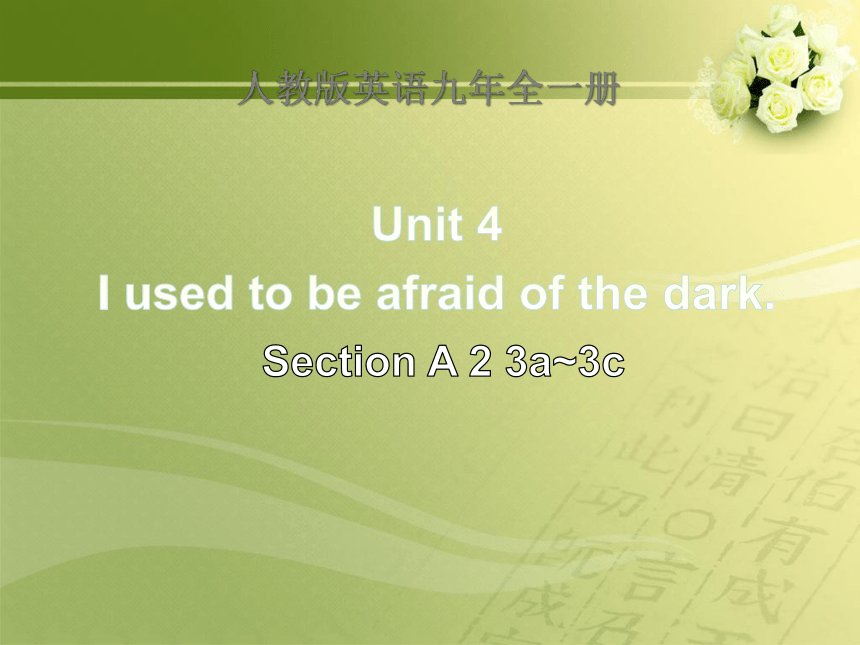 | |
| 格式 | ppt | ||
| 文件大小 | 1.0MB | ||
| 资源类型 | 教案 | ||
| 版本资源 | 人教新目标(Go for it)版 | ||
| 科目 | 英语 | ||
| 更新时间 | 2022-11-16 20:03:50 | ||
图片预览

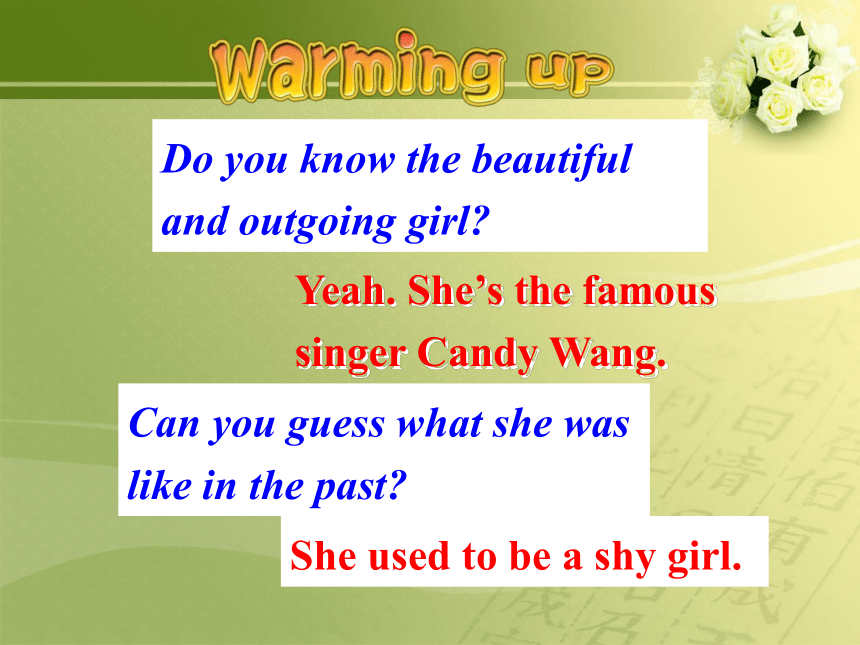
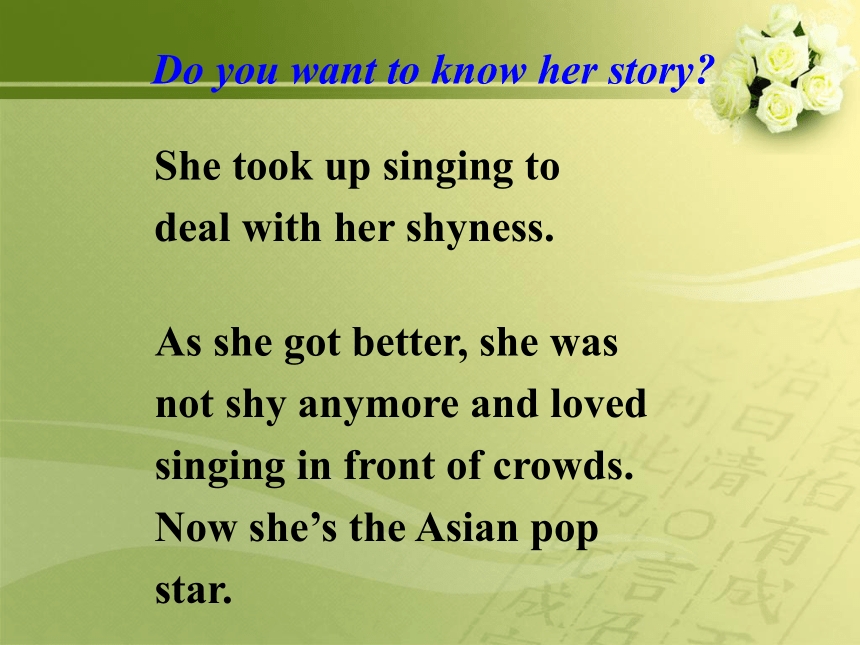
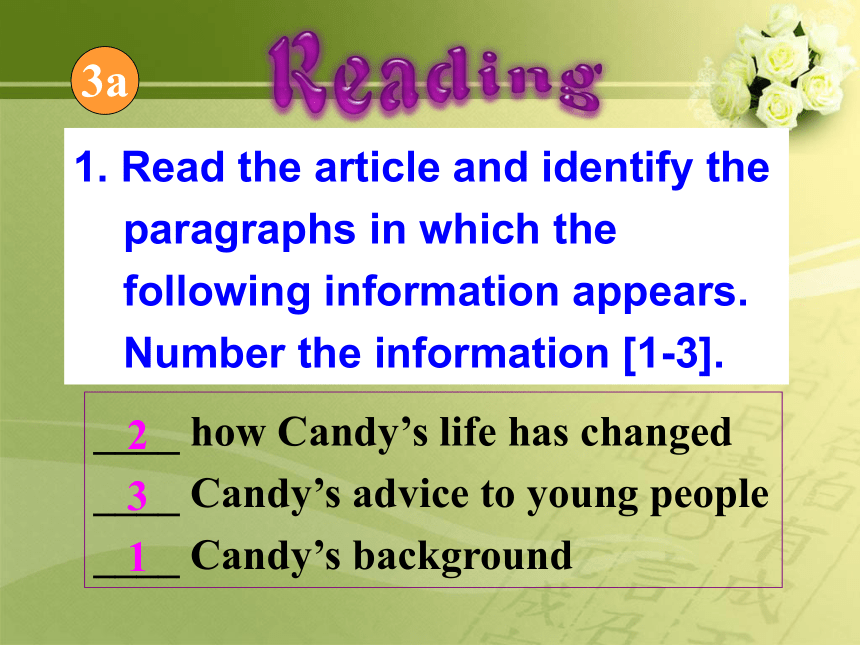
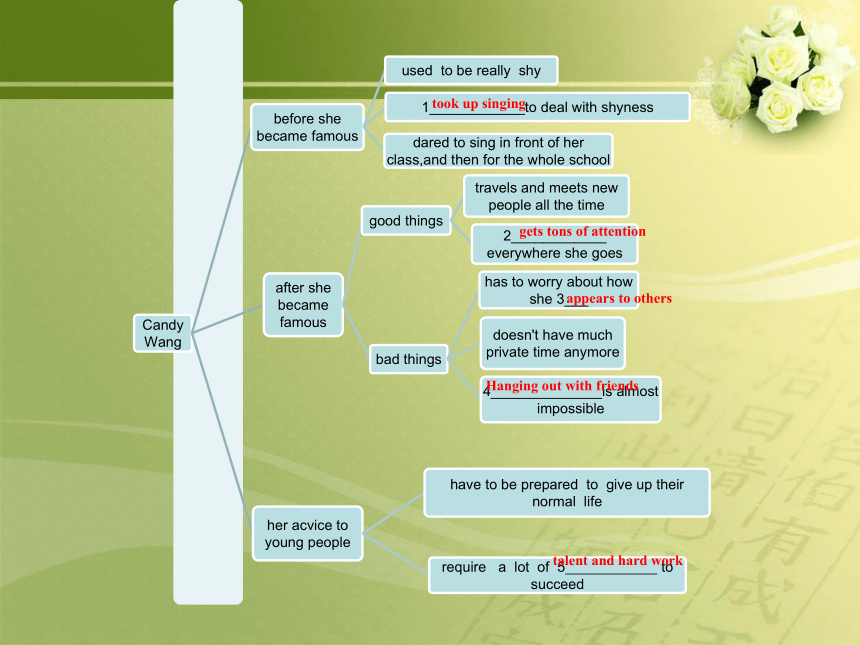
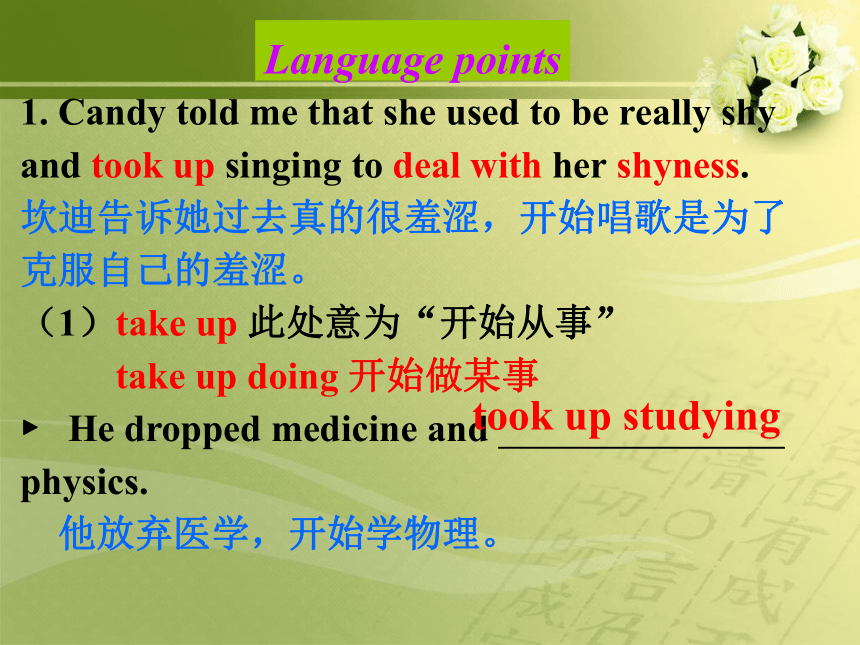
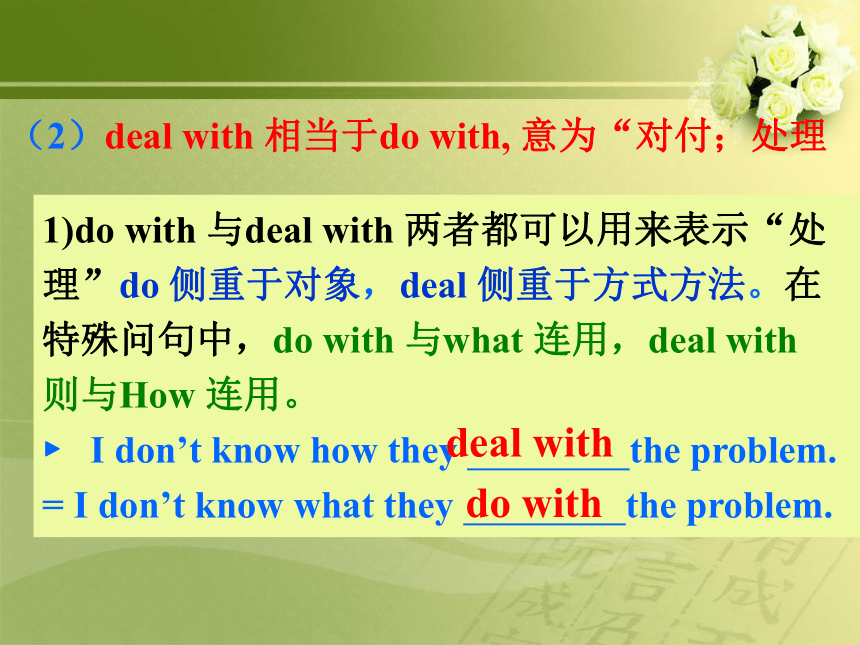
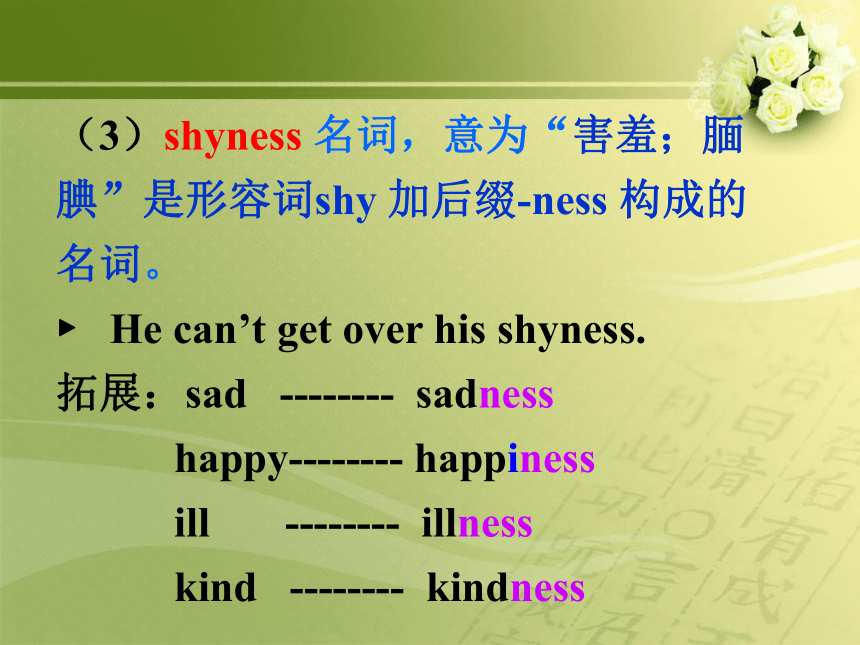
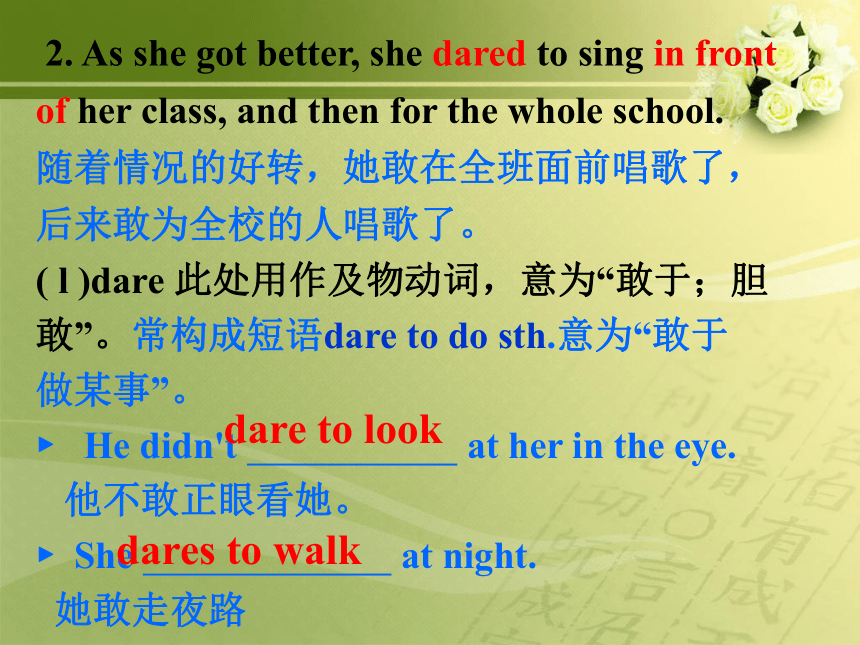
文档简介
(共22张PPT)
人教版英语九年全一册
Can you guess what she was like in the past
Do you know the beautiful and outgoing girl
She used to be a shy girl.
Yeah. She’s the famous singer Candy Wang.
She took up singing to deal with her shyness.
As she got better, she was not shy anymore and loved singing in front of crowds. Now she’s the Asian pop star.
Do you want to know her story
____ how Candy’s life has changed
____ Candy’s advice to young people
____ Candy’s background
1
1. Read the article and identify the paragraphs in which the following information appears. Number the information [1-3].
2
3a
3
took up singing
gets tons of attention
appears to others
Hanging out with friends
talent and hard work
1. Candy told me that she used to be really shy
and took up singing to deal with her shyness.
坎迪告诉她过去真的很羞涩,开始唱歌是为了
克服自己的羞涩。
(1)take up 此处意为“开始从事”
take up doing 开始做某事
He dropped medicine and
physics.
他放弃医学,开始学物理。
Language points
took up studying
(2)deal with 相当于do with, 意为“对付;处理
do with 与deal with 两者都可以用来表示“处
理”do 侧重于对象,deal 侧重于方式方法。在
特殊问句中,do with 与what 连用,deal with
则与How 连用。
I don’t know how they the problem.
= I don’t know what they the problem.
deal with
do with
(3)shyness 名词,意为“害羞;腼腆”是形容词shy 加后缀-ness 构成的名词。
He can’t get over his shyness.
拓展:sad -------- sadness
happy-------- happiness
ill -------- illness
kind -------- kindness
2. As she got better, she dared to sing in front
of her class, and then for the whole school.
随着情况的好转,她敢在全班面前唱歌了,
后来敢为全校的人唱歌了。
( l )dare 此处用作及物动词,意为“敢于;胆
敢”。常构成短语dare to do sth.意为“敢于
做某事”。
He didn't at her in the eye.
他不敢正眼看她。
She at night.
她敢走夜路
dare to look
dares to walk
(2)in front of 意为 “在......的前面”。
辨析 in front of 与 in the front of
in front of : 在……前面,强调在某一物体外
部的前面。
in the front of :“在…… 的前部”,强调在某一
物体内部的前面
There is a little child the house.
房前有一个小孩。
in front of
3. Now she’s not shy anymore and loves
singing in front of crowds.
现在她再也不羞涩了,并且喜欢当众唱歌。
(1)not ... anymore = no more,意为“不再”。
He doesn't come late anymore.
= He comes late. 他不再迟到了。
no more
4. I didn’t use to be popular in school, but now
I get tons of attention everywhere I go.”
过去我在学校里默默无闻,但是现在无论我
走到哪里,都得到太多的关注。
(1)tons of 意为“很多的;大量的”,是英语中一种夸张的表达方式。ton的本义为“吨”。
He has been late for school tons of times.
他上学屡次迟到。
(2)get…attention 意为“得到/引起......注意”
5. “Well,” she begins slowly, “you have to be
prepared to give up your normal life.
“嗯, ” 她缓缓道来, “你得准备放弃正常的生活。
⑴ prepare 在此处用作及物动词,意为“准备;
预备”。 常用搭配有:prepare sb. sth. 表示“给某人准备某物”
也可用prepare sth. for sb. 表示。
She prepared us a nice breakfast.
= She prepared a nice breakfast for us.
她给我们准备了可口的早餐。
(4) prepare to do sth. 表示“准备做某事”
They were preparing (cross) the river
when it began to rain.
他们正准备过河,这时突然下雨了。
to cross
6.区别 a number of与the number of
a number of+复名“许多..”
做主语谓语动词用复数形式。
the number of+复名 “……的数量”
做主语谓语动词用单数形式。
A number of students ____(be) on the playground.
The number of students (be) fifty.
学生的数量是50。
are
is
单项选择
1. I _______ short straight hair, but now I have long curly hair.
A. use to be B. use to have
C. used to have D. used to be
2. She _______ listen to country music, but now she _______ listening to pop music.
A. used to; used to B. is used to; is used to
C. is used to; used to D. used to; is used to
1. Mary is used to _____ a
T-shirt and jeans.
A. wear B. put on
C. wearing D. putting on
【解析】词义辨析。句意“玛丽习惯于穿T恤衫和牛仔裤”,be used to doing sth.习惯于做某事,因此排除选项A、B,wear强调状态,put on强调动作,由句意知此处表示状态,因此选C。
2. In our school library there ______ a number of books on science, and in these years the number of them _____ growing larger and larger.
A.have, are B. is, are
C. are, is D. has, is
3. He could properly deal ________ all kinds of situations.
A. to B. into C. at D. with
4.The boy stood before the teacher, not daring________ anything.
A.talk B. talks about
C. to say D. saying
人教版英语九年全一册
Can you guess what she was like in the past
Do you know the beautiful and outgoing girl
She used to be a shy girl.
Yeah. She’s the famous singer Candy Wang.
She took up singing to deal with her shyness.
As she got better, she was not shy anymore and loved singing in front of crowds. Now she’s the Asian pop star.
Do you want to know her story
____ how Candy’s life has changed
____ Candy’s advice to young people
____ Candy’s background
1
1. Read the article and identify the paragraphs in which the following information appears. Number the information [1-3].
2
3a
3
took up singing
gets tons of attention
appears to others
Hanging out with friends
talent and hard work
1. Candy told me that she used to be really shy
and took up singing to deal with her shyness.
坎迪告诉她过去真的很羞涩,开始唱歌是为了
克服自己的羞涩。
(1)take up 此处意为“开始从事”
take up doing 开始做某事
He dropped medicine and
physics.
他放弃医学,开始学物理。
Language points
took up studying
(2)deal with 相当于do with, 意为“对付;处理
do with 与deal with 两者都可以用来表示“处
理”do 侧重于对象,deal 侧重于方式方法。在
特殊问句中,do with 与what 连用,deal with
则与How 连用。
I don’t know how they the problem.
= I don’t know what they the problem.
deal with
do with
(3)shyness 名词,意为“害羞;腼腆”是形容词shy 加后缀-ness 构成的名词。
He can’t get over his shyness.
拓展:sad -------- sadness
happy-------- happiness
ill -------- illness
kind -------- kindness
2. As she got better, she dared to sing in front
of her class, and then for the whole school.
随着情况的好转,她敢在全班面前唱歌了,
后来敢为全校的人唱歌了。
( l )dare 此处用作及物动词,意为“敢于;胆
敢”。常构成短语dare to do sth.意为“敢于
做某事”。
He didn't at her in the eye.
他不敢正眼看她。
She at night.
她敢走夜路
dare to look
dares to walk
(2)in front of 意为 “在......的前面”。
辨析 in front of 与 in the front of
in front of : 在……前面,强调在某一物体外
部的前面。
in the front of :“在…… 的前部”,强调在某一
物体内部的前面
There is a little child the house.
房前有一个小孩。
in front of
3. Now she’s not shy anymore and loves
singing in front of crowds.
现在她再也不羞涩了,并且喜欢当众唱歌。
(1)not ... anymore = no more,意为“不再”。
He doesn't come late anymore.
= He comes late. 他不再迟到了。
no more
4. I didn’t use to be popular in school, but now
I get tons of attention everywhere I go.”
过去我在学校里默默无闻,但是现在无论我
走到哪里,都得到太多的关注。
(1)tons of 意为“很多的;大量的”,是英语中一种夸张的表达方式。ton的本义为“吨”。
He has been late for school tons of times.
他上学屡次迟到。
(2)get…attention 意为“得到/引起......注意”
5. “Well,” she begins slowly, “you have to be
prepared to give up your normal life.
“嗯, ” 她缓缓道来, “你得准备放弃正常的生活。
⑴ prepare 在此处用作及物动词,意为“准备;
预备”。 常用搭配有:prepare sb. sth. 表示“给某人准备某物”
也可用prepare sth. for sb. 表示。
She prepared us a nice breakfast.
= She prepared a nice breakfast for us.
她给我们准备了可口的早餐。
(4) prepare to do sth. 表示“准备做某事”
They were preparing (cross) the river
when it began to rain.
他们正准备过河,这时突然下雨了。
to cross
6.区别 a number of与the number of
a number of+复名“许多..”
做主语谓语动词用复数形式。
the number of+复名 “……的数量”
做主语谓语动词用单数形式。
A number of students ____(be) on the playground.
The number of students (be) fifty.
学生的数量是50。
are
is
单项选择
1. I _______ short straight hair, but now I have long curly hair.
A. use to be B. use to have
C. used to have D. used to be
2. She _______ listen to country music, but now she _______ listening to pop music.
A. used to; used to B. is used to; is used to
C. is used to; used to D. used to; is used to
1. Mary is used to _____ a
T-shirt and jeans.
A. wear B. put on
C. wearing D. putting on
【解析】词义辨析。句意“玛丽习惯于穿T恤衫和牛仔裤”,be used to doing sth.习惯于做某事,因此排除选项A、B,wear强调状态,put on强调动作,由句意知此处表示状态,因此选C。
2. In our school library there ______ a number of books on science, and in these years the number of them _____ growing larger and larger.
A.have, are B. is, are
C. are, is D. has, is
3. He could properly deal ________ all kinds of situations.
A. to B. into C. at D. with
4.The boy stood before the teacher, not daring________ anything.
A.talk B. talks about
C. to say D. saying
同课章节目录
- Unit 1 How can we become good learners.
- Section A
- Section B
- Unit 2 I think that mooncakes are delicious!
- Section A
- Section B
- Unit 3 Could you please tell me where the restroom
- Section A
- Section B
- Unit 4 I used to be afraid of the dark.
- Section A
- Section B
- Unit 5 What are the shirts made of?
- Section A
- Section B
- Review of Units 1-5
- Unit 6 When was it invented?
- Section A
- Section B
- Unit 7 Teenagers should be allowed to choose their
- Section A
- Section B
- Unit 8 It must belong to Carla.
- Section A
- Section B
- Unit 9 I like music that I can dance to.
- Section A
- Section B
- Unit 10 You're supposed to shake hands.
- Section A
- Section B
- Review of Units 6-10
- Unit 11 Sad movies make me cry.
- Section A
- Section B
- Unit 12 Life is full of the unexpected
- Section A
- Section B
- Unit 13 We're trying to save the earth!
- Section A
- Section B
- Unit 14 I remember meeting all of you in Grade 7.
- Section A
- Section B
- Review of Units 11-14
